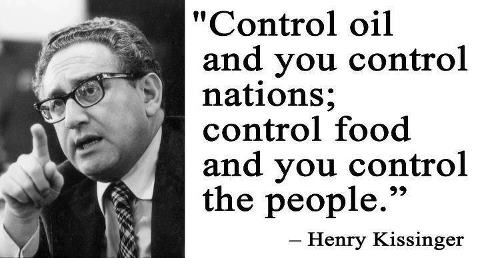Claudio Schuftan

World Nutrition, Vol 5 No. 9, Sept 2014
What is a good food system?

Rome, 1976. Then US Secretary of State Henry Kissinger pledged that by 2000 no child on earth would go to bed hungry. But he also had another strategy in mind, as stated above in 1970
‘Food system’. The term is an application of systems analysis to the food chain, something already tried in the late 1970s. I have my doubts about its validity and relevance today. What is certainly wrong, is any concept of a single food system. Think about this please. I see this revival as intended to depoliticise the food and nutrition issue also bringing it out of the multiple cultural contexts in which it should be treated. Such an approach veers away from what matters much more, which is people’s food sovereignty (1) and the right to nutrition. These are the real challenges for sustainability.
The concept of a ‘food system’ when articulated, typically includes nothing about the empowerment of producers and consumers. It leaves out the key role of breastfeeding. It overlooks bio-diversity and the importance of balanced local diets. It tacitly condones the use of genetically modified crops. It has nothing to say about land-grabbing and unfair landholding. It usually is careful to be silent about the global negative ecological and economic impact of the prevailing agro-industrial agricultural production model. It apparently cares little (if any) about the protection of small scale food production and producers In general, it does not really ask or respond to the fundamental question of what, how, why and for whom foods are produced.
Why does sustainable development matter?
Because what we are or should be thinking about here is the importance of culturally appropriate food systems as selected by the very people involved in them. Furthermore, sustainability depends on tackling the social, economic and political determinants of nutrition which the ideology behind focusing on the food system ignores.
What is your best hope from the Oxford conference?
First, I am glad to see that the Conference speaks of food systems in plural. I hope this permeates in the discussions. But I also hope that participants consider the rejection of the depoliticisation of food and nutrition issues, and denounces giving only lip service to the principles, standards and practice of the human right to adequate nutrition. Denunciation is of course not enough, but it is a start!
Here are just a few of quite a long list of issues that must be faced and resolved:
- Reckless advertising and marketing of ultra-processed food and drink products most of all to children.
- Neglect of ongoing food and nutrition needs during civil unrest and natural or man-made disasters (as are famines).
- Intentional overemphasis on a medical approach to chronic diseases, as well as on blaming individual behaviours together with a careful refusal to admit the impact and consequences of transnational market penetration.
- Avoidance of legislation designed to protect human rights, such as lack of regulations that protect women during pregnancy and lactation.
- Refusal to protect populations and responsible industry with laws that restrict or prohibit predatory corporate greed.
Name a recent experience you would like to inform the conference
Last November, on behalf of the People’s Health Movement, I participated in a preparatory meeting for the UN International Conference on Nutrition being held this coming November. The meeting was held in Rome at the headquarters of the Food and Agriculture Organization. We were ‘educated’ by a presentation on ‘the food system’. Slide after slide projected boxes and arrows and interpenetrating lines to show ‘its complexity’.
During the ‘Q&A’, I asked the presenter how the food system protagonists (producers and consumers) were to understand that complex net of relationships if they were to play the role expected from them. He said that he did not understand my question and then passed on. Let’s be sure that Oxford is not like that in any way.
Add anything else as you wish
Our struggle requires a deep commitment to justice, fairness and human rights. In our current world, producers and consumers of food are de-jure claim holders. So, what cannot be forgotten when discussing food systems is precisely the role of these as de-facto claim holders. A deliberate focus on empowering them –with a special focus on women and activists in this field– is thus needed. Here, allow me to mention the role of World Nutrition in the last two years. The journal has become a unique resource for all of us struggling to discern the forces at play, including those of us dedicated to fulfilment of the true vision, mission and work of public health nutrition
Note
1 Food sovereignty is a precondition of food security. It rejects food systems in which decisions are made solely by corporate entities and others removed from local food systems. It includes the human right to healthy and culturally appropriate food produced through socially just and ecologically sensitive methods. It entails peoples’ right to define their own food, agriculture, livestock and fisheries systems. These freedoms to produce and consume nourishing food are the key to food sovereignty. Hunger, malnutrition, and associated outcomes are not equally distributed across social groups or indeed nations, for not all people have such freedoms. This relates food sovereignty to empowerment so that people, communities and populations achieve control over their lives, gain a voice, become real citizens, and influence and participate in decision-making processes. (PHM)
Claudio Schuftan is an assistant editor of WN
He is a physician, and a member of the People’s Health Movement global steering committee

